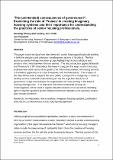Files in this item
“The (unintended) consequences of governance?” : Examining the role of “frames” in creating imaginary housing systems and their importance for understanding the practices of senior housing professionals
Item metadata
| dc.contributor.author | Crawford, Joseph | |
| dc.date.accessioned | 2016-10-27T23:33:31Z | |
| dc.date.available | 2016-10-27T23:33:31Z | |
| dc.date.issued | 2015 | |
| dc.identifier | 185740373 | |
| dc.identifier | 1fd0bafd-d141-476a-85a2-56d997426687 | |
| dc.identifier | 84938553706 | |
| dc.identifier | 000357515900004 | |
| dc.identifier.citation | Crawford , J 2015 , ' “The (unintended) consequences of governance?” : Examining the role of “frames” in creating imaginary housing systems and their importance for understanding the practices of senior housing professionals ' , Housing, Theory and Society , vol. 32 , no. 3 , pp. 302-319 . https://doi.org/10.1080/14036096.2015.1025913 | en |
| dc.identifier.issn | 1403-6096 | |
| dc.identifier.uri | https://hdl.handle.net/10023/9721 | |
| dc.description.abstract | This paper examines data from interviews with senior housing professionals working in both the statutory and voluntary homelessness sectors in Scotland. The first section presents findings from both groups highlighting the contradictions and tensions which exist between the two sectors. The second section applies Boltanski and Thevenot’s theoretical framework to explore the ways in which housing professionals make sense of and justify their role in the provision of housing services to homeless applicants and those threatened with homelessness. The analysis of the data will be used to expand Carlen’s concept of the “imaginary” in order to develop a more nuanced understanding of how the objective structures of governance shape and reshape the subjectivities of those working in the field of housing management. The important and often overlooked concept of “misrecognition” will be used to explain why the tensions exist, as well as shedding light on why the apparent power imbalance between statutory and voluntary sectors goes mostly unnoticed. | |
| dc.format.extent | 559896 | |
| dc.language.iso | eng | |
| dc.relation.ispartof | Housing, Theory and Society | en |
| dc.subject | Homelessness | en |
| dc.subject | Frame analysis | en |
| dc.subject | Imaginary housing systems | en |
| dc.subject | Justification and criticism | en |
| dc.subject | Professional practice | en |
| dc.subject | Housing management | en |
| dc.subject | GF Human ecology. Anthropogeography | en |
| dc.subject | HV Social pathology. Social and public welfare | en |
| dc.subject | E-NDAS | en |
| dc.subject.lcc | GF | en |
| dc.subject.lcc | HV | en |
| dc.title | “The (unintended) consequences of governance?” : Examining the role of “frames” in creating imaginary housing systems and their importance for understanding the practices of senior housing professionals | en |
| dc.type | Journal article | en |
| dc.contributor.institution | University of St Andrews. Geography & Sustainable Development | en |
| dc.identifier.doi | https://doi.org/10.1080/14036096.2015.1025913 | |
| dc.description.status | Peer reviewed | en |
| dc.date.embargoedUntil | 2016-10-27 |
This item appears in the following Collection(s)
Items in the St Andrews Research Repository are protected by copyright, with all rights reserved, unless otherwise indicated.

